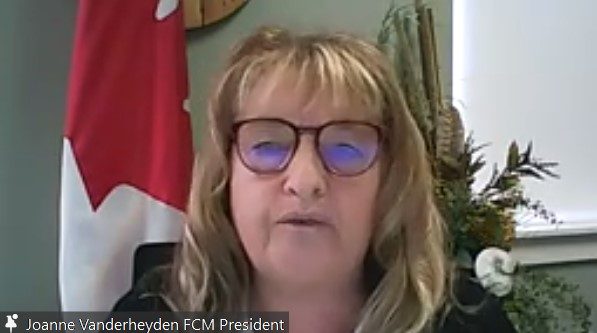Municipalities lay out frontline solutions for federal candidates
 FCM President Joanne Vanderheyden discusses the organization’s recently announced recommendations for candidates in the upcoming federal election.
FCM President Joanne Vanderheyden discusses the organization’s recently announced recommendations for candidates in the upcoming federal election.
As the federal election campaign heats up, the Federation of Canadian Municipalities (FCM) is calling on all parties to work with cities and communities of all sizes to drive a stronger, more inclusive nationwide recovery.
On September 2, FCM released a package of “achievable frontline solutions to pressing challenges.” These challenges include addressing job creation, tackling climate change, and providing solutions to the housing crisis.
“A lot of these things are urgent. They need to happen now. These are not wishes, this is need,” said FCM President and Strathroy-Caradoc Mayor Joanne Vanderheyden. “We’re talking about renewing core infrastructure, building, modern transit, tackling housing prices, protecting people from climate extremes. These truly are not just nice to haves, these are central for Canadians coast to coast to coast, regardless of who’s in power at the federal level.”
Offering Frontline Solutions
Frontline Solutions for Canada’s Recovery consolidates proposals that FCM has shared with federal parties. They will drive sustainable growth and build better lives for Canadians. They include:
- Frontline solutions to the housing crisis – From scaling up the proven Rapid Housing Initiative to end homelessness to expanding affordable rental options for Canadians facing inadequate, overcrowded housing – disproportionately among Indigenous, racialized, and newcomer communities.
- Frontline solutions to the climate crisis – Strengthening local resilience to new weather extremes while supporting local pathways to net-zero emissions – from ensuring continued public transit growth to investing in low-carbon solutions like community energy generation, building retrofits, and green fleets.
- Digital inclusion for all Canadians – Building on recent progress to ensure everyone can access a reliable, affordable, high-speed Internet connection – focusing on rural, remote, northern, and Indigenous communities, where the digital divide has been so starkly exposed by the pandemic.
- Frontline community investment – Including doubling the job-creating Canada Community-Building Fund (formerly Gas Tax Fund) that empowers communities of all sizes to renew core infrastructure – from safe roads that keep people moving to cultural/recreation facilities that promote social inclusion.
Cost of Pandemic Recovery
The investment FCM is calling for raises the question of cost. Halifax Mayor Mike Savage is chair of FCM’s Big City Mayors’ Caucus. He acknowledged Canada faces a significant financial deficit. But, he added, it also has to cope with an infrastructure deficit as well.
That said, he is confident Canadians understand the need to invest in the pandemic recovery.
“These are investments we need to make as cities and the future of our cities. Canadians have shown they support investments in people and in infrastructure,” Savage said. “We saw that during COVID people respond positively to governments that invest in people, that invest in infrastructure. It’s not something we can do without the support of provincial and federal, both orders of government. We all have to work together.”
The four pillars to a strong recovery that FCM laid out are important for all communities. But the question of digital connectivity was one Ray Orb, Reeve of Cupar, Saskatchewan, addressed as a priority. Orb, who chair of FCM’s Rural Forum, said the call to bring high-speed Internet to all Canadians is essential.
Promise of Internet Connectivity
During the pandemic, Canadians have gone online for work, school, and basic human interaction. But too many rural Canadians still don’t have that option.
“Access to broadband means that a small businesses can sell their goods online. Farmers can find real time data. And entire communities can reach their full potential,” Orb said. “It’s money well spent, but essential to be able to get our economy moving again. And if we don’t spend that money, I think we’re going to be a lot worse off. During COVID we have so many connectivity issues out in rural Canada.”
Path to a Successful Future
Vanderheyden said that after everything Canadians have been through, they deserve progress they can see. They need to see it in the places where they live, work, and raise families. Working together, she added, is the key to building a stronger, more inclusive and sustainable Canada on the other side of COVID-19.
In making her point, Vanderheyden reaffirmed municipal governments are the ones closest to people’s daily lives. And as such, they are positioned to drive a successful and inclusive recovery.
“We see what’s needed, what works on the ground, and we’re ready to work with every single federal party to deliver frontline solutions to some of Canada’s biggest national challenge,” she said. “It’s about investing, it’s about economic recovery, and generating growth.” MW
✯ Municipal World Insider and Executive Members: Thank you for supporting Municipal World. We are working on a detailed member survey to be released later this year to ensure we are serving your needs. Please send any feedback directly to Municipal World Editor and Publisher Scott Vokey at scott@municipalworld.com in the meantime.
Sean Meyer is Senior Content Editor for Municipal World.
Related resource materials:
- Who’s Driving the Grader? and other governance questions
- Welcome To The Hall: A practical guide for municipal leaders
- Leading: The Real Value of a Mayor and Council



